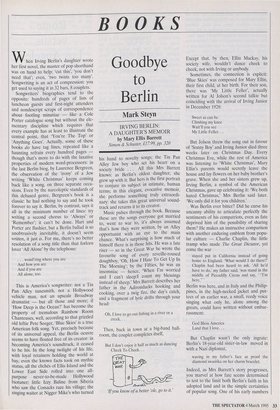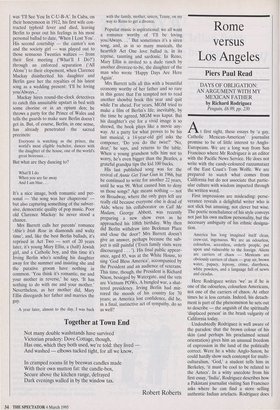BOOKS
Goodbye to Berlin
Mark Steyn
IRVING BERLIN: A DAUGHTER'S MEMOIR by Mary Ellis Barrett Simon & Schuster, f17.99, pp. 320 When Irving Berlin's daughter wrote her first novel, the master of pop shorthand was on hand to help: 'cut this', 'you don't need that'; even, 'two twists too many'. Songwriting is an act of compression: you get used to saying it in 32 bars, 8 couplets.
Songwriters' biographies tend to the opposite: hundreds of pages of lists of luncheon guests and first-night attenders and nondescript scraps of correspondence about footling minutiae — like a Cole Porter catalogue song but without the ele- mentary discipline which requires that every example has at least to illustrate the central point, that 'You're The Top' or `Anything Goes'. Actually, some of these books do have tag lines, repeated like a haunting refrain every hundred pages though that's more to do with the laxative properties of modern word-processors: in the last Berlin biog, by Laurence Bergreen, the observation of the 'irony' of a Jew writing 'White Christmas' keeps coming back like a song, on three separate occa- sions. Even by the narcoleptic standards of this debased genre, Bergreen's book is a classic: he had nothing to say and he took forever to say it. Berlin, by contrast, says it all in the minimum number of lines: try writing a second chorus to 'Always' or `Remember'; it can't be done. Hart and Porter are flashier, but a Berlin ballad is so unobtrusively inevitable, it doesn't seem written, it just is. For me, there's no better resolution of a song title than that forlorn lover 'All Alone' by the telephone:
. . . wond'ring where you are
And how you are And if you are All alone, too.
This is America's songwriter: not a Tin Pan Alley tunesmith, not a Hollywood vehicle man, not an upscale Broadway dramatist — but all those and more; if `How Deep is the Ocean?' has become the property of tremulous Rainbow Room Chanteuses, well, according to that grizzled old leftie Pete Seeger, 'Blue Skies' is a true American folk song. Yet, precisely because of its universal appeal, the Berlin oeuvre seems to have floated free of its creator: in becoming America's soundtrack, it ceased to be his. In the long twilight of his life, with loyal retainers holding the world at bay, even the known facts took on mythic status, all the clichés of Ellis Island and the Lower East Side rolled into one all- purpose never-to-be-made Hollywood biotuner: little Izzy Baline from Siberia who saw the Cossacks raze his village; the singing waiter at Nigger Mike's who turned his hand to novelty songs; the Tin Pan Alley Jew boy who set his heart on a society bride . . . All this Mrs Barrett knows: as Berlin's oldest daughter, she grew up with it. But hers is the first portrait to conjure its subject in intimate, human terms; in this elegant, evocative memoir, she performs something truly extraordi- nary: she takes this great universal sound- track and returns it to its creator.
Music pulses through the book. Because these are the songs everyone got married to, went to war to, it's always assumed that's how they were written, by an Alley opportunist with an eye to the main chance. What's surprising is how much of himself there is in those hits. He was a late riser — so in the Great War he wrote the favourite song of every reveille-roused doughboy, 'Oh, How I Hate To Get Up In The Morning'; by the Fifties, he was an insomniac — hence, 'When I'm worried and I can't sleep/I count my blessings instead of sheep.' Mrs Barrett describes her father in the Adirondacks hooking and cooking, over a twig fire, the day's catch, and a fragment of lyric drifts through your head:
Oh, I love to go out fishing in a river or a creek..
Then, back in town at a big-band ball- room, the couplet completes itself,
But I don't enjoy it half as much as dancing Cheek To Cheek...
If you know of a better 'ole, go to it.' Except that, by then, Ellin Mackay, his society wife, wouldn't dance cheek to cheek, not with Irving or anybody.
Sometimes, the connection is explicit: `Blue Skies' was composed for Mary Ellin, their first child, at her birth. For their son, there was 'My Little Feller', actually written for Al Jolson's second talkie but coinciding with the arrival of Irving Junior in December 1928:
Sweet as can be Climbing my knee Wait'll you see My Little Feller.. .
But Jolson threw the song out in favour of 'Sonny Boy' and Irving Junior died three weeks later on Christmas Day. Every Christmas Eve, while the rest of America was listening to 'White Christmas', Mary Ellin's parents would secretly leave the house and lay flowers on her baby brother's grave. When she and her sisters grew up, Irving Berlin, a symbol of the American Christmas, gave up celebrating it: 'We both hated Christmas,' Mrs Berlin said later. `We only did it for you children.'
Was Berlin ever bitter? Did he curse his uncanny ability to articulate perfectly the sentiments of his compatriots, even as fate deprived him of the possibility of sharing them? He makes an instructive comparison with another enduring emblem from popu- lar culture — Charlie Chaplin, the little tramp who made The Great Dictator, yet come the war
stayed put in California instead of going home to England. 'What would I do there?' Chaplin had been heard to ask. All he'd have to do,' my father said, 'was stand in the middle of Piccadilly Circus and say, ' "I'm here." '
Berlin was here, and in Italy and the Philip- pines, in the high-necked jacket and put- tees of an earlier war, a small, reedy voice singing what only he, alone among the greats, could have written without embar- rassment:
God Bless America Land that I love.. .
But Chaplin wasn't the only ingrate: Berlin's 18-year-old sister-in-law moved in with a Nazi diplomat,
waving in my father's face as proof the diamond swastika on her charm bracelet.
Indeed, as Mrs Barrett's story progresses, you marvel at how fate seems determined to test to the limit both Berlin's faith in his adopted land and in the simple certainties of popular song. One of his early numbers was 'I'll See You In C-U-B-A'. In Cuba, on their honeymoon in 1912, his first wife con- tracted typhoid fever and died, leaving Berlin to pour out his feelings in his most personal ballad to date, 'When I Lost You'. His second courtship — the cantor's son and the society girl — was played out to those sensuous Twenties waltzes — from their first meeting (What'll I Do?') through an enforced separation (`All Alone') to their elopement, when Clarence Mackay disinherited his daughter and Berlin gave her the royalties of his latest song as a wedding present: 'I'll be loving you/Always...'
Mackay hires round-the-clock detectives to catch this unsuitable upstart in bed with some chorine or in an opium den; he throws a party for the Prince of Wales and tells the guards to make sure Berlin doesn't get in. But, of course, Berlin, in one sense, has already penetrated the sacred precincts:
Everyone is watching as the prince, the world's most eligible bachelor, dances with the daughter of the house, one of the world's great heiresses...
But what are they dancing to?
What'll I do When you are far away And I am blue..
It's a nice image, both romantic and per- sonal — 'the song was her chaperone' but also capturing something of the subver- sive, democratic quality of pop music. Poor old Clarence Mackay: he never stood a chance.
Mrs Barrett calls her parents' romance Abie's Irish Rose in diamonds and waltz time', and, like the best Berlin ballads, it's reprised in Act Two — sort of 20 years later, it's young Mary Ellin, a (half) Jewish girl, and a Catholic boy, and this time it's Irving Berlin who's sending his daughter away for the summer and insisting she and the putative groom have nothing in common. 'You think it's romantic, me and your mother in reverse,' he says. 'It has nothing to do with me and your mother.' Nevertheless, as her mother did, Mary Ellin disregards her father and marries the guy.
A year later, almost to the day, I was back with the family, mother, sisters, Tenny, on my way to Reno to get a divorce.
Popular music is aspirational: we all want a romance worthy of 'I'll be loving you/Always... ' But sometimes it's a siren song, and, as in so many musicals, the heartfelt Act One love ballad is, in its reprise, taunting and sardonic. In Reno, Mary Ellin is invited to a dude ranch by another divorcee-to-be, the daughter of the man who wrote 'Happy Days Are Here Again'.
Mrs Barrett tells all this with a beautiful economy worthy of her father and so rare in this genre that I'm tempted not to read another showbiz book this year and quit while I'm ahead. For years, MGM tried to make a film of Berlin's life; inevitably, by the time he agreed, MGM was kaput. But his daughter's eye for a vivid image is so shrewd, the book plays like a movie any- way. At a party for what proves to be his last musical, a 14-year-old girl asks the composer, `Do you do the twist?"No, dear,' he says, and returns to the table. When a young grandson tells him not to worry, he's even bigger than the )3eatles, a grateful grandpa tips the kid 100 bucks.
His last published song was for the revival of Annie Get Your Gun in 1966, but he continued to write for another 22 years, until he was 99. What caused him to deny us those songs? Age means nothing — not on Broadway, where the only guys left are really old because everyone else is dead of Aids; where his collaborator on Call Me Madam, George Abbott, was recently preparing a new show even as he approached his 108th birthday. Why then did Berlin withdraw into Beekman Place and close the door? Mrs Barrett doesn't give an answer, perhaps because the sub- ject is still painful (`Even family visits were discouraged . . '). His final public appear- ance, aged 85, was at the White House, to sing 'God Bless America', accompanied by the President and an audience of veterans. This time, though, the President is Richard Nixon, besieged by Watergate, and the vets are Vietnam POWs. A bungled war, a shat- tered presidency. Irving Berlin had mir- rored the moods of his country for 70 years; as America lost confidence, did he, in a final, instinctive act of sympathy, do so as well?
Robert Roberts
Together at Town End
Not many double washstands have survived Victorian prudery: Dove Cottage, though, Has one, which they both used, we're told: they lived And washed — elbows tucked tight, for all we know, In cramped rooms lit by beeswax candles made With their own mutton fat: the candle-box, Secure above the kitchen range, defrayed Dark evenings walled in by the window tax.



























































 Previous page
Previous page